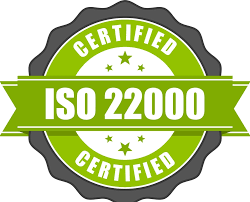ISO 22000 - Food safety Management System

Benefits of Implementing ISO 22000:
1. Enhanced Food Safety: ISO 22000 helps organizations identify and control food safety hazards throughout the supply chain, reducing the risk of foodborne illnesses and ensuring the safety of food products for consumers.
2. Compliance with Regulatory Requirements: ISO 22000 helps organizations comply with food safety regulations and requirements imposed by regulatory authorities and customers, reducing the risk of non-compliance and potential legal consequences.
3. Improved Market Access and Credibility: Certification to ISO 22000 demonstrates an organization's commitment to food safety and quality, enhancing its reputation and credibility with customers, suppliers, and stakeholders. It can also improve market access by meeting the requirements of international food safety standards.
4. Cost Savings: ISO 22000 can lead to cost savings by reducing the incidence of food safety incidents, product recalls, and rejected shipments. It also helps organizations streamline their food safety processes, improve operational efficiency, and minimize waste and rework.
5. Risk Management: ISO 22000 helps organizations identify, assess, and manage food safety risks effectively, allowing them to proactively address potential hazards and prevent food safety incidents before they occur.
For Food Safety Management Systems (FSMS), the relevant standard
is ISO 22000, which specifies requirements for a comprehensive food safety
management system. Here's an overview of ISO 22000 and its key components:
ISO 22000: Food Safety
Management Systems
ISO 22000 is an international standard developed by the
International Organization for Standardization (ISO) that provides requirements
for organizations in the food industry to ensure food safety throughout the
supply chain. It is applicable to any organization, regardless of size or
complexity, involved in the production, processing, distribution, or handling
of food products. Key elements of ISO 22000 include:
1. Food Safety Management System (FSMS) Requirements: ISO 22000
outlines the requirements for establishing, implementing, maintaining, and
continually improving a food safety management system. This includes
establishing a food safety policy, defining food safety objectives, and
implementing control measures to ensure the safety of food products.
2. Hazard Analysis and Risk Assessment: ISO 22000 requires
organizations to conduct hazard analysis and risk assessment to identify and
evaluate potential hazards associated with food safety. This includes biological,
chemical, and physical hazards that may occur at any stage of the food supply
chain.
3. Prerequisite Programs (PRPs): ISO 22000 emphasizes the
importance of implementing prerequisite programs (PRPs) to control basic food
safety hazards and maintain a hygienic environment throughout the food
production process. PRPs may include practices such as personnel hygiene,
sanitation, and pest control.
4. HACCP Principles: ISO 22000 incorporates Hazard Analysis and
Critical Control Points (HACCP) principles as part of its requirements for food
safety management. This includes identifying critical control points (CCPs),
establishing critical limits, monitoring CCPs, and implementing corrective
actions when deviations occur.
5. Management Commitment and Leadership: ISO 22000 requires top
management commitment and leadership to ensure the effective implementation of
the food safety management system. This includes providing resources,
establishing roles and responsibilities, and promoting a culture of food safety
throughout the organization.
6. Communication and Training: ISO 22000 emphasizes the importance
of communication and training to ensure that personnel understand their roles
and responsibilities in maintaining food safety. This includes providing food
safety training, communicating food safety information, and ensuring effective
communication with external stakeholders.
7. Verification and Validation: ISO 22000 requires organizations
to verify and validate the effectiveness of their food safety management system
through monitoring, measurement, and analysis of food safety performance. This
includes conducting internal audits, implementing corrective actions, and
periodically reviewing the FSMS.
8. Continuous Improvement: ISO 22000 promotes a culture of continuous improvement in food safety management. This includes identifying opportunities for improvement, implementing preventive measures to reduce food safety risks, and continually updating and improving the FSMS based on feedback and lessons learned
Overall, ISO 22000 provides a systematic approach to food safety management, helping organizations establish robust food safety systems, meet regulatory requirements, and ensure the safety and quality of food products for consumers.

